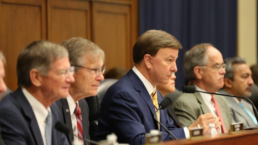Though all of the lawmakers in a recent analysis deny any impropriety, the capacity for competing interests is clear.
By Nick Cleveland-Stout, Responsible Statecraft
The New York Times reported this week that 97 members of Congress “bought or sold stocks, bonds, or other financial assets that intersected with their congressional work or reported similar transactions by their spouse or a dependent child” between 2019 and 2021. With more than 3,700 such trades in those three years alone, the investigation reveals potential conflicts of interest in nearly every area of policymaking.

Defense policy is no different. At least 25 members sat on committees that shape national security policy while simultaneously trading financial assets in companies that could create competing interests with their work, such as defense stock. With a near-even party split, Democrats and Republicans may have found a rare instance of common ground.
The majority of these members sat on the House and Senate Armed Services Committees — the committees responsible for the budget and oversight of the Department of Defense.
The list includes the former chair of the Senate Armed Services Committee, James Inhofe (R-Okla.), who bought and sold shares of technology companies as they fought over a $10 billion cloud computing contract with the Pentagon, which eventually went to Microsoft. When the Pentagon later decided to cancel the contract, House Armed Services Committee member Rep. Pat Fallon (R-Texas) sold up to $250,000 worth of Microsoft stock two weeks before it was publically announced. Fallon served on the subcommittee which oversaw the deal, though a spokesperson said at the time that he had “absolutely no prior knowledge the Pentagon intended to cancel” the contract.
Recent Posts
“Arrest Now, Ask Questions Later”: Why Did L.A. ICE Agents Arrest and Jail U.S. Citizen Andrea Velez?
July 3, 2025
Take Action Now “They didn’t have vests that said ICE or anything. Their cars didn’t have license plates. … Just because of the color of our…
Trump’s Big, Beautiful Bill Is Naked Class War
July 3, 2025
Take Action Now Trump’s “Big, Beautiful Bill” trades tax cuts on millionaires for the dissolution of society.By Hamilton Nolan, In These Times…
Mayor Mamdani’s First Day, A Zero Hour Conversation With Richard Wolff
July 2, 2025
Take Action Now If elected, what would Mayor Mamdani do on his first day in City Hall? How would a democratic socialist govern as a big-city mayor?……
The U.S. Is Funding A Bloodbath At Gaza Aid Centers
July 2, 2025
Take Action Now The admin just gave $30M to GHF, the organization at the center of charges that Israel is weaponizing assistance and shooting at…




